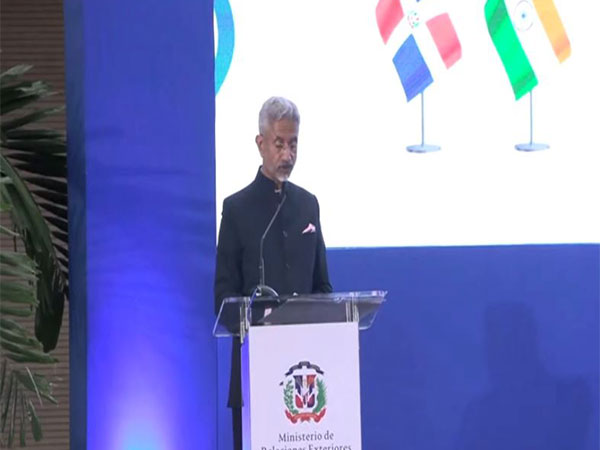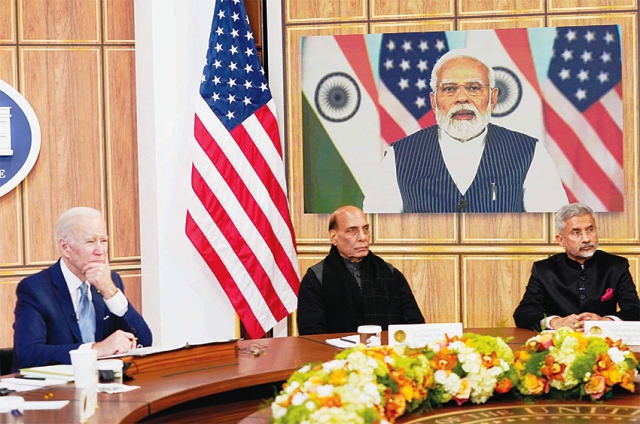India’s External Affairs Minister, Dr Subrahmanyam Jaishankar, has had to deal with a very difficult foreign policy challenge for India that arose from the Russian invasion into Ukraine. However, his deft handling of the situation has proved his mettle. The diplomatic challenge needed juggling several interests and conflicts at the same time. So far, Indian Foreign Ministry has handled the issue with skill without coming under any pressure from the parties pulling in different directions, including USA, Russia and China as well as other smaller groups.
The 2+2 dialogue between India and the United States of America combined with the video call between Prime Minister Narendra Modi and President Joe Biden is significant for various reasons. It provided an opportunity for India and the US to better locate concerns of the other party vis-à-vis the Russian invasion.
For India it is important to pacify the world community about its reluctance to vote on numerous occasions on the Russian aggression, at the United Nations. Though India professes a neutral stand, it is part of a group with North Korea, Iran and China. This causes apprehensions among the US and its NATO allies as India has acquired respectability and status due to its economic strength and recently due to its efforts to mitigate the effects of COVID 19 pandemic. However, during the current situation, India has also maintained that any form of armed aggression upon another sovereign nation is unacceptable.
The 2+2 dialogue may have been an apt platform to clarify to the US, the reasons behind India’s neutral stand on Russia’s aggression. On the other hand, it is common knowledge that India’s defence sector and its numerous weapons systems are structurally dependent upon Russia’s arms and weapons industry. It is estimated that Russian arms equipment and weapons systems account for close to 70% of India’s defence supplies.
Against this background, it is perhaps easy to comprehend India’s neutrality and its absenteeism on crucial votes against Russia in the UN, which has wrongly been perceived as pro-Russia. The pressure, nevertheless, on India from the US and in general the West, has been unrelenting since the invasion began. India, though, has stuck to its position, bearing in mind the consequences thereof and the options it may possess. During this difficult period, however, the Indian establishment’s deft diplomacy and strategic autonomy has prominently been on display.
At the centre of this tumultuous and testing period for Indian diplomatic establishment, Dr Jaishankar has shown exemplary geopolitical acumen. Under his leadership the MEA anticipated Western response to India’s position and has crafted befitting and optimum rejoinders. Since the beginning of the Ukraine crisis, statements from the MEA have been measured and calibrated to pacify the international community.
India has maintained that any act of violent aggression against a sovereign state is deplorable and have urged the warring parties to resolve the crisis diplomatically. Such astute stance and demeanour have in turn led the international community to recognize that it is national interest that has driven India’s voting behaviour at the UN, the precise message that India wanted to convey.
In the contemporary world, any event of such magnitude like the Russian invasion of Ukraine has a ripple effect on the entire world. India’s recent proclivity toward the United States and the new alliances in the Indian Ocean and the Indo-Pacific region has also felt the tremors.
The formulation of the term Indo-Pacific and the subsequent implementation of a counter China strategy through the Quadrilateral Dialogue (QUAD) have been gradually gaining strength in the recent years. Ukraine Crisis and Indian response brought the QUAD and its members to reassess the situation, which is visible in the visits of Heads of states to New Delhi. The Japanese Prime Minister Fumio Kishida visited New Delhi for an Annual Summit meeting under the ‘Special Strategic and Global Partnership’, but a large part of meeting was devoted to the Ukraine crisis. India accommodated Japanese concerns on the crisis in the statement issued after the deliberations.
Immediately after the Indo-Japan Summit, the Australian PM Scott Morrison also held a virtual summit with Prime Minister Modi. The Aussie PM, while condemning the Russian actions in Ukraine, elicited an understanding of the Indian stance. Further, he elaborated that “he and Modi were of the opinion that the conflict could not be a reason for diverting attention from issues of the Indo-Pacific region”. This indicated that the relationship is not affected. A subtext hidden in the outcome and statements of both summit meetings is a clear indication that geographical distance from an international event still matters. The location of the crisis at the western end of the Eurasian landmass and away from the Indo-Pacific space remains instrumental in geopolitical thinking of Japan and Australia.
The aforementioned summits and their timing point to India’s rising significance in the international system and particularly in the Indo-Pacific. It was only befitting that the Chinese Foreign Minister, Mr. Wang Yi visited New Delhi soon after. This holds tremendous weight in the wake of the ongoing crisis in Eastern Ladakh since the summer of 2020.
It was understood that the Chinese FM was here to invite and persuade the Indian PM to join the BRICS summit in China to be held later in the year. Under the circumstances, Indian diplomacy under the leadership of Dr. Jaishankar has been steadfast and clear in conveying to the Chinese that normalization of relations between the two Asian giants is possible only after complete disengagement at the LAC in Ladakh. Hopefully, before the BRICS Summit, negotiations on the issue will bear results.
Therefore it can be said that the Ukraine Crisis has been turned into a diplomatic opportunity by the Indian diplomatic establishment. The 2+2 summit, Modi-Biden virtual Summit, Indo-Japan Summit, Modi-Morrison virtual summit and finally the visit by the Chinese FM are a testimony to clarity in India’s diplomacy since the crisis began. Moreover, the British Prime Minister Mr. Boris Johnson and the President of the European Union, Ms. Ursula von der Leyen have also visited India in the last week.
Whether it is India’s stand on the crisis or its India’s economic strength or the West’s need, India has become the go-to-destination in the face of deep Russia-China partnership. India has been able to drive home the point that India’s national interests take precedence over international linkages and alliances under the able leadership of Dr. S. Jaishankar, the Minister of External Affairs. This perhaps is the proverbial feather in the cap for Modi government as the top diplomat was elevated to the post of External Affairs Minister in May 2019.

